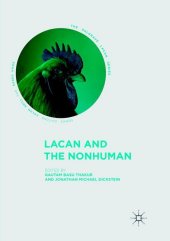 Neuerscheinungen 2019Stand: 2020-02-01 |
Schnellsuche
ISBN/Stichwort/Autor
|
Herderstraße 10
10625 Berlin
Tel.: 030 315 714 16
Fax 030 315 714 14
info@buchspektrum.de |

Gautam Basu Thakur, Jonathan Michael Dickstein
(Beteiligte)
Lacan and the Nonhuman
Herausgegeben von Basu Thakur, Gautam; Dickstein, Jonathan Michael
Softcover reprint of the original 1st ed. 2018. 2019. ix, 286 S. 5 SW-Abb., 5 Farbtabellen. 210 mm
Verlag/Jahr: SPRINGER, BERLIN; SPRINGER INTERNATIONAL PUBLISHING 2019
ISBN: 3-319-87644-9 (3319876449)
Neue ISBN: 978-3-319-87644-3 (9783319876443)
Preis und Lieferzeit: Bitte klicken
This book initiates the discussion between psychoanalysis and recent humanist and social scientific interest in a fundamental contemporary topic - the nonhuman. The authors question where we situate the subject (as distinct from the human) in current critical investigations of a nonanthropoentric universe. In doing so they unravel a less-than-human theory of the subject; explore implications of Lacanian teachings in relation to the environment, freedom, and biopolitics; and investigate the subjective enjoyments of and anxieties over nonhumans in literature, film, and digital media. This innovative volume fills a valuable gap in the literature, extending investigations into an important and topical strand of the social sciences for both analytic and pedagogical purposes.
PART I: DEFINITIONS AND CONTEXTS.- Chapter 1: "Bestiarum Vocabulum Lacaniensis: A Concise Outline of Psychoanalytic Zoology" by Dany Nobus (Brunel University London).- Chapter 2: "Man is not Entirely in Man" by Kiarina Kordela (Macalester University).- Chapter 3: "Freud, Lacan, and the Human Nonhumanity of Coitus Interruptus" by Jamieson Webster (Eugene Lang College and New York University).- Chapter 4: "´ L´extermination de tout symbolisme des cieux ´: Reading the Lacanian Letter as Inhuman ´Apparatus´ and its Implications for Ecological Thinking" by Kevin Andrew Spicer (University of St. Francis).- Chapter 5: "Affective Posthumanism" by Marie-Louise Angerer (University of Potsdam).- Chapter 6: "The Undead: Lacan and Vico, the Critical Link" by Donald Kunze (Penn State University).- Chapter 7: "The Sovereign Signifier: Agamben and the Nonhuman" by Paul Eisenstein (Otterbein University).- Chapter 8: "Lacan and the Mechanism of Full Speech" by Ed Pluth (California State University, Chino).- PART 2: APPLICATIONS.- Chapter 9: "Like an Animal: A Simile Instead of a Subject" by Todd McGowan (University of Vermont).- Chapter 10: "A horse-no worse? Phobia and the failure of human metaphors in psychoanalysis" by Celeste Pietrusza and Jess Dunn (Duquesne University).- Chapter 11: "Beckett´s ´Marionette Theater´: Psychoanalysis, Ontological Violence and The Language of Desubjectification in Malloy and Malone Dies " by Amanda Duncan (Pacific University).- Chapter 12: "Do Electric Sheep Dream of Androids?" by Calum Neill (Edinburgh Napier University).- Chapter 13: "ASMR Mania, Trigger Politics, and the Anxiety of Digital Repletion" by Hugh Manon (Clark University).- Chapter 14: "For the Love of Nonhumanity: Transference and the Anxiety of Algorithmic Critique" by Jonathan Michael Dickstein (Independent Scholar).
"Thakur (English, Boise State Univ.), and Dickstein (independent scholar) have collected essays which integrate a neglected discourse between the recent ´nonhuman turn´ in the humanities and psychoanalysis ... . This new, original angle is lively with possibilities. ... The book is suited to faculty and advanced students of philosophy, critical theory, psychoanalysis (especially Lacanian), and the history of ideas. Summing Up: Recommended. Graduate students, researchers, and professionals." (R. H. Balsam, Choice, Vol. 56 (5), January, 2019)
Gautam Basu Thakur is Associate Professor of English at Boise State University, USA where he teaches courses in critical theory, postcoloniality and globalization, and British Empire studies. His first book, Postcolonial Theory and Avatar, was published in 2015.
Jonathan Michael Dickstein is an independent scholar. He teaches literature and media studies and researches connections between psychoanalysis, mathematics, and narrative theory.


